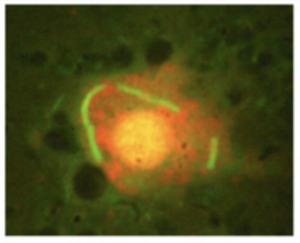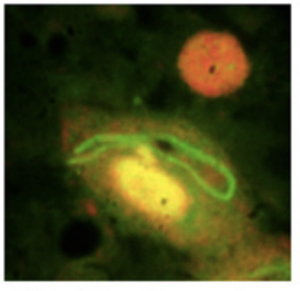Experts boldly state that multiple sclerosis is an autoimmune disease where the immune system attacks nerve tissue, yet this claim has never been proven. This post will bring clarity to this topic and provide evidence that MS is NOT an autoimmune disease, but instead in MS the immune system is simply battling parasites that have not been identified by our standard of care.
There are over 80 autoimmune diseases and each autoimmune disease is considered unique. Autoimmune disease is a theory or belief that genetic and environmental factors cause our immune B and T cells to attack any tissue or organ in the body. The immune system’s main job is to protect the body by destroying and removing toxins, infections and other foreign material. With autoimmune disease, it is believed that the immune system has turned against the body and starts attacking its own tissues and organs.
Infection is a common trigger for autoimmune disease and the microbes that live in the body impact the degree of sickness in people who suffer from autoimmune diseases. Autoimmune diseases affect people of all ages, but especially women.
Criteria for autoimmune disease
To diagnose autoimmune disease, specific tests should show:
- the presence of autoantibodies in the blood which are antibodies that target substances made by a person’s own body. Autoantibodies can destroy cells that have the substances on them or can make it easier for other white blood cells to destroy them.
- the presence of autoreactive B or T immune cells in the blood
- the ability to cause disease by transferring cells or autoantibodies to experimental animals
- the presence of inflammation and immune complexes at a site of damage
- the ability to transfer the disease across the placenta.
It is surprising that many diseases considered autoimmune do not fully meet the above criteria and if the criteria aren’t met, the disease may then be called an inflammatory disease or an immune-mediated disease, meaning the immune system is activated but they don’t know why.
Although autoantibodies are considered important for the diagnosis and classification of autoimmune diseases, often there is no obvious link between what the autoantibody attacks and the illness a person suffers from.
Researchers know that certain autoantibodies are associated with specific symptoms, but they don’t know what causes their association.
It is interesting that autoantibodies are found in healthy individuals, in people who suffer from diseases that are not considered autoimmune, and autoantibodies of the same type can be found in different diseases.
Also, researchers have found autoantibodies present in patients who are diagnosed with autoimmune diseases, yet are asymptomatic.
Limitations of testing for autoantibodies
Blood tests have not found autoantigens (the substances made by the body that the autoantibodies react to) where they would be expected, which can lead to false-negative results. False-positive test results are also a concern.
Although many autoantibodies have been identified, tests are only available for a few of them. For example, over a hundred different autoantibodies have been reported with lupus, but tests for only a few are available.
Rheumatic, skin, joints and vasculature, kidney, pulmonary vasculature diseases and non-rheumatic diseases such as autoimmune hepatitis are all associated with autoantibodies against parts of the cell nucleus.
“Although studies of autoimmune disease usually assume that autoantibodies initiate inflammation and damage, it is nevertheless possible that these antibodies arise as a consequence of damage induced by some other mechanism.”[i]
The role of microorganisms in autoimmune disease
Microbes are the most likely trigger of autoimmune disease. The immune response to different infections can be symptomatic or asymptomatic. The microbiota includes all the worms, protists, bacteria and fungi that live in the body. These microbes are responsible for producing many toxins and foreign substances.
There is a huge variety of microorganisms that live in the gut, mouth and on the skin. More bacterial cells are present in the body than human cells. A disruption in the microbiome can lead to dysbiosis and disturbances in how the body normally functions, especially with respect to the immune system.
Dysbiosis can induce both nonspecific and specific immune responses that lead to what is called autoreactivity. For example, in rheumatoid arthritis, the increased presence of the bacterium Prevotella copri in the gut is associated with increased arthritis symptoms and the presence of autoantibodies. In lupus, increases in the bacterium Ruminococcus gnavus is associated with increased disease activity as well as the presence of autoantibodies.
Leaky gut allows microbes from the intestines to move into the blood, settle in and damage tissue and trigger autoantibody production. Current tests have shown that microbes can be present in virtually any tissue.
Certain microbes present in small numbers will not impact health but if they become more populated in the body, the immune system will react to them, which leads to inflammation and the symptoms of autoimmune disease.
Diet has a major impact on immune function because it greatly affects the types of microbes that live in the body and the integrity of the lining of the digestive tract.
Patients may show autoantibodies in their blood many years before the signs and symptoms of disease.
In the following video, experts admit that it has not been proven that MS is an autoimmune disease.
They admit that an auto-antigen (or self-antigen) that an autoantibody targets, has never been identified in MS. They agree that MS is an immune mediated condition where the immune system is actively fighting something.
Making sense of autoimmune disease
Understanding how microbes that live in our body impact us in health and disease is the most heavily researched topic in science today.
MS and all autoimmune diseases are inflammatory conditions. Inflammation is the war zone where the immune system is battling infection and the toxins they produce. The immune system’s main job is to defend us from infections and their toxins. There are thousands of different microbes in the body that can become out of balance and cause disease. With leaky gut, microbes can leave the gut and live in any part of the body, including the central nervous system. We can also become infected through biting insects. Our current tests to identify these parasitic infections is very limited and thus inaccurate.
Forward thinking integrative practitioners believe that the concept of autoimmunity cannot exist without the presence of infection. They believe that what appears to be autoimmune disease is simply the immune system fighting unidentified microbes and their toxins, and what appears to be autoantibodies is just the immune system removing damaged cells and fragments of cells caused by the infection.
On the Live Disease Free website under the “research” tab as well as in our blog posts, we have documented many microbes that cause MS symptoms. For example, pathologist Dr. Alan MacDonald discovered Borrelia bacteria ( which causes Lyme disease) in the myelin sheath of nerve cells in Alzheimer’s patients.
Dr. Alan MacDonald – Alzheimer’s disease hippocampal neuron containing fragments of a Borrelia spirochete.
Dr. Alan MacDonald – Alzheimer’s disease hippocampal neuron containing a Borrelia spirochete.
The green wormlike structures in the above images are fragments or entire Borrelia bacteria in the myelin sheath of nerve cells. Dr MacDonald’s research proves that bacteria can infect the myelin sheath of nerve cells and when they do, it would make sense that the immune system would try to remove them.
He has also found Borrelia, small roundworms, tapeworm larval cysts and juvenile tapeworms in the central nervous system of MS subjects. Other studies have reported fungus in the central nervous system of MS patients, even within the nucleus of brain cells.
When exposed to antibiotics, Borrelia produces cysts which are dormant forms of the bacteria that are much more difficult to treat. Dr. Klinghardt believes that the immune system’s response to the Lyme cysts is another cause of what may appear to be autoimmune disease.
These are just a few examples of infections documented in science that are present in people diagnosed with MS and other so-called autoimmune diseases.
The theory of autoimmune disease is not logical for the many reasons stated in this post but also because when the parasitic infections are treated effectively, the immune system no longer causes inflammation and so-called autoimmune disease no longer exists. If autoantibodies persist and cause autoimmune disease, then people would not be able to recover from autoimmune disease – yet they do.
The concept of “autoimmune disease” warranted the need and use for immunosuppressive maintenance drugs and a multitrillion dollar sickness industry with exorbitant profits for pharmaceutical companies.
The very panel that dictates how MS is diagnosed and treated believes that there is no value in looking for parasitic infections that could cause MS. They are solely focussed on maintaining the status quo, which is immune suppression with maintenance disease modifying drugs. People are suffering terribly, becoming disabled, losing their independence and dying prematurely. This must change!
There are real solutions to recover from parasites today!
To restore health, we must focus on treating the cause of inflammation, which are parasites. First, identify the enemy (parasites), then support the body and treat the parasites while following a holistic approach. When parasitic infections are treated effectively, we can overcome inflammation or disease.
If you’re frustrated with the fact that our standard of care STILL doesn’t offer a real solution for treating MS and other diseases, then click on the link below to watch Pam Bartha’s free masterclass training and discover REAL solutions that have allowed Pam and many others to live free from MS and other diseases.
CLICK Here to watch Pam’s masterclass training
Or take the Health Blocker Quiz to see if you could have parasite infections
Reference:
https://www.nature.com/articles/s41581-023-00720-1
[i] file:///Users/pambartha/Downloads/s41581-023-00720-1.pdf

Clinically diagnosed with multiple sclerosis at the age of 28, Pam chose an alternative approach to recovery. Now decades later and still symptom free, she coaches others on how to treat the root cause of chronic disease, using a holistic approach. She can teach you how, too.
Pam is the author of Become a Wellness Champion and founder of Live Disease Free. She is a wellness expert, coach and speaker.
The Live Disease Free Academy has helped hundreds of Wellness Champions in over 15 countries take charge of their health and experience profound improvements in their life.



